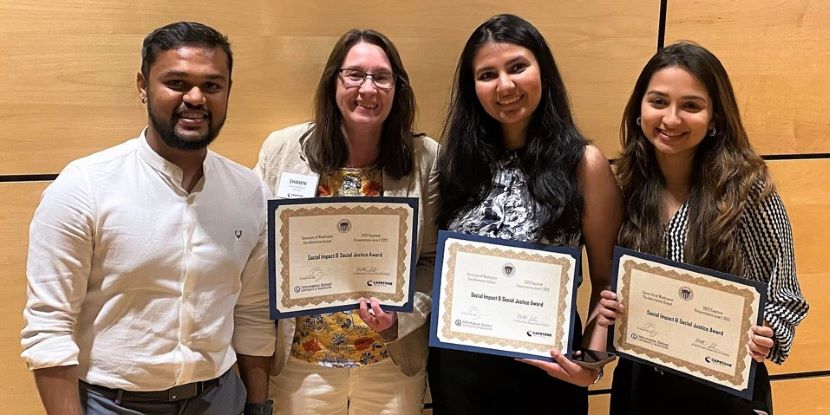
WASHINGTON STATE LIBRARY SPONSORS UW CAPSTONE STUDENTS
Every year, members of Washington State Library’s (WSL) Library Development team sponsor student projects that help support the work of the State Library. University of Washington (UW) iSchool Capstone projects are the culmination of the students’ learning experience at the iSchool. The students distill the knowledge and skills acquired in academic courses and apply them to real-world projects.
For Shawn Schollmeyer, Washington Digital Newspapers Coordinator, iSchool Capstone students pitched their ideas for a Washington Digital Newspapers data visualization to prepare a final project to meet their Master of Science in Information Management (MSIM) graduation requirements. Aayushi Gandhi, Manthan Mehta, and Harshi Thaker of “Team Data Whiz” gathered the data requirements, created a project plan, and developed “An Interactive Data Visualization Initiative for Washington State Library.”

“Team Data Whiz pulled the data they needed from the Library of Congress’ Chronicling America and Washington Digital Newspapers’ collections to show the number of issues for each title digitized in an interactive map,” said Schollmeyer.
The team created an interactive infographic resource that enables users to view digitized newspaper issues in Washington by county, city, title, and subject in a visually appealing way.
“Being able to sort the data by subject will help library staff identify priority subjects for digitizing and help researchers find social topics available online in the State Library’s collection,” Schollmeyer added.
For their efforts, “Team Data Wiz” won the MSIM Social Justice & Social Impact Award at the Capstone Gala.

WSL’s Open Data Librarian Kathleen Sullivan worked with a Capstone team of UW MSIM students to clean up and standardize tags on the state’s open-data portal (data.wa.gov/browse), which the State Library supports in cooperation with WaTech’s Open Data Program Manager Cathi Greenwood. For most of its history, the portal has been a decentralized operation, with data publishers independently assigning tags to particular content. The result is a pile of nearly a thousand tags with many near-duplicates. About half of those tags apply to only one item — not very useful for helping users find similar content.
Team {Range} — Isabella Eriksen, Max Lieberman, Ken Masumoto, and Alana Montoya — reviewed the list of tags for misspellings, variants, inconsistencies, and other shortfalls, and made recommendations to consolidate and otherwise improve the existing tags. The team also drafted rules for a tag protocol (e.g., use plural form for categories) and created a dashboard for site administrators to monitor site tags and keep them trim and productive. The open-data program will now work with agency publishers to implement recommendations and guidance.

Learn more about the Team {Range} project.
Sara Peté, Director of the Washington Center for the Book (an affiliate of the Library of Congress Center for the Book, administered by WSL), worked with two Capstone teams that focused on Washington State Zine Contest projects. Team AmaZine (composed of Master of Library and Information Science [MLIS] students Patricia Lopez, Keiko Martinez, Kari Salisbury, and Akhila Sriram) and its project included an online workshop and Workshop and Circulating Kits. Erin Shapland and Zach Wagman formed another zine team and created an online workshop.

These projects focused on raising the profile of the annual Washington State Zine contest and building community through zine-making. Both groups created materials to show how easy, fun, and affordable a zine workshop can be.
If your library or organization has a good project for future UW iSchool Capstone students, find out more about the sponsorship process here.
Through the power of libraries, Washington State Library — a division of the Office of the Secretary of State — connects Washingtonians to their history by supporting quality education, literacy and reading, and lifetime learning. Programs include the Washington Talking Book & Braille Library for people unable to read standard print, and Institutional Library Services in partnership with correctional facilities and adult psychiatric hospitals.